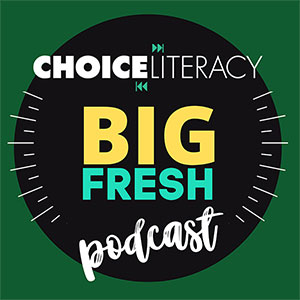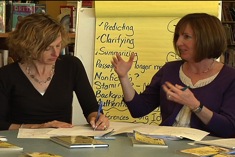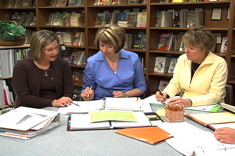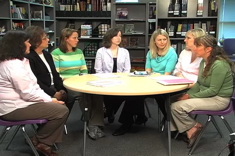In this podcast, Jennifer Allen talks with Franki Sibberson about mentoring veteran teachers. A transcript is included below the player.

Franki Sibberson: What is your role in working with the veteran teachers as a literacy coach?
Jennifer Allen: I work with veteran teachers in different capacities. I work with them during professional development for the school. I work with them, maybe, with coaching in the classrooms, but recently I've started a veteran teacher group where I'm working with a group of veteran teachers monthly throughout the year to support their own learning and to refine their practice as classroom teachers.
Franki: In terms of the monthly meetings, are there certain topics that you cover or do the teachers pick those? How is that going to work, do you know?
Jen: In terms of working with veteran teachers, I started it last year thinking that I would kind of pick the topics and move them through assessments and curriculum planning, but what I really found was that the veteran teachers really set their own direction, and they, as a group, really determined what they wanted to work on, and they decided as a group of veteran teachers that they wanted to learn more about teaching inference and how to do demonstration lessons for one another.
I find that veteran teachers, just like beginning teachers, really need time to collaborate and to talk, but one of the differences between being a new teacher is the veteran teachers really do have the expertise and just need time to refine their art.
Franki: Oh, that makes sense. Now will you just continue that this year or do you have new topics this year or wait to see how it goes?
Jen: Well, it's funny. When I started the veteran teacher group last year I kind of thought I would do it for one year, and then maybe a new group of teachers would move on, and by the end of last spring, the particular group of teachers I'm working with, which are a group of teachers working in grades three through five, which include regular education teachers and special education teachers, asked if they could stay together for another year. They felt they had just really got it started in terms of their peer observations and partnering up for lessons. They spent the year designing their lessons together, and then would take time to observe one another teach a lesson, to go back and refine a lesson, and they would like to continue their exploration this year.
I think they're kind of on to the idea of how to really learn from one another, and there's a comfort level and trust now in terms of observing one another and designing lessons together, and I think they're going to continue that this year.
Franki: Oh, that makes sense. It'll be the same group of teachers then.
Jen: It'll be the same group of teachers. They've bonded, and they're really getting into some deeper learning.
Franki: What are the challenges when working with veteran teachers?
Jen: I think the biggest challenge in working with veteran teachers is really just finding resources and hitting their zone of proximal development and where their needs are, so that you're honoring their expertise and their years of experience, and support them the best to meet their needs, as opposed to imposing what I think they may need.
Franki: And you may have answered this: How is supporting veteran teachers different from supporting the newer teachers or beginning teachers?
Jen: Well, I think supporting veteran teachers and supporting new teachers in many ways are the same because they all benefit from time, resources and collaboration. But I think the biggest differences is in terms of honoring the expertise. I find that new teachers like to spend a lot of time in terms of learning more strategies in terms of organization and behavior management, where veteran teachers really like to dig deep into instructional practice.
Franki: Okay. Do you do anything to support beginning and veteran teachers together? I imagine you do in your coaching. What are some strategies when you're supporting those different levels?
Jen: In terms of the same professional development setting?
Franki: How do you support, you know, since they're a little bit different, you've talked about. How do you support them together throughout the year, too?
Jen: In the study groups that we have at our schools, veteran teachers and new teachers are together all the time within the groups, and again, I think new teachers bring in a whole fresh look in optimism in education, which just kind of breeds an infectious passion, which veteran teachers eat up. They want to hear the new thinking and the new ideas that they're bringing into school, and the new teachers are appreciative of the thinking and the ideas that are shared from the veteran teachers. So it's very much, I think, they both gain from one another.
One of the interesting things that happened last year with a veteran teacher group, we also support new teachers in a very similar format, where new teachers meet once a month for support, and last year we combined the veteran teachers and the new teachers together for the day. And again, they would go out, and they did peer observations together, and they came back and they did a lesson together, and again, it's just the amazing learning from one another; that they're partners within the school working towards the same goal.
You know, one of the resources I've used with both new and veteran teachers is Debbie Miller's book, Teaching with Intention, because I think it's so important to really ground our beliefs in terms of why do we teach what we teach, and that resource, that particular text has just been a great resource no matter how long you've been teaching.
Franki: So you use that with both beginning and veteran teachers?
Jen: Both beginning and veteran teachers in terms of really getting teachers to think about why they do what they do, and so that they can really ground it in educational foundation and theory.









